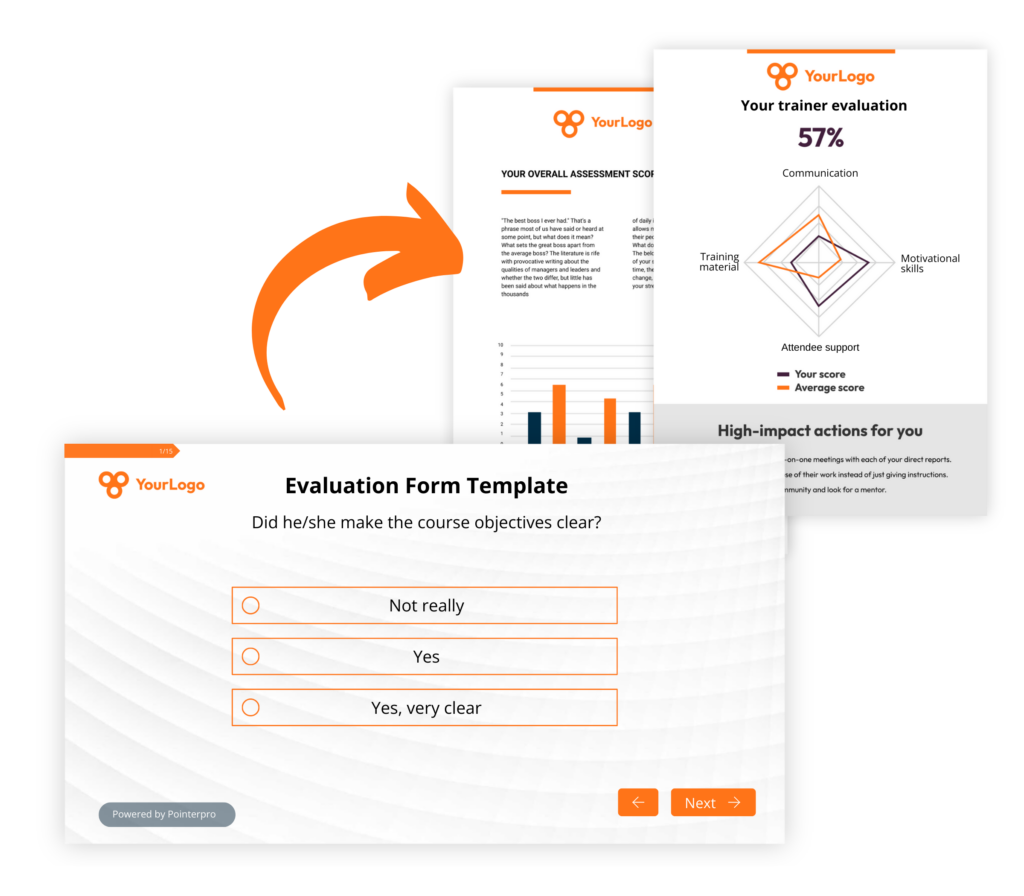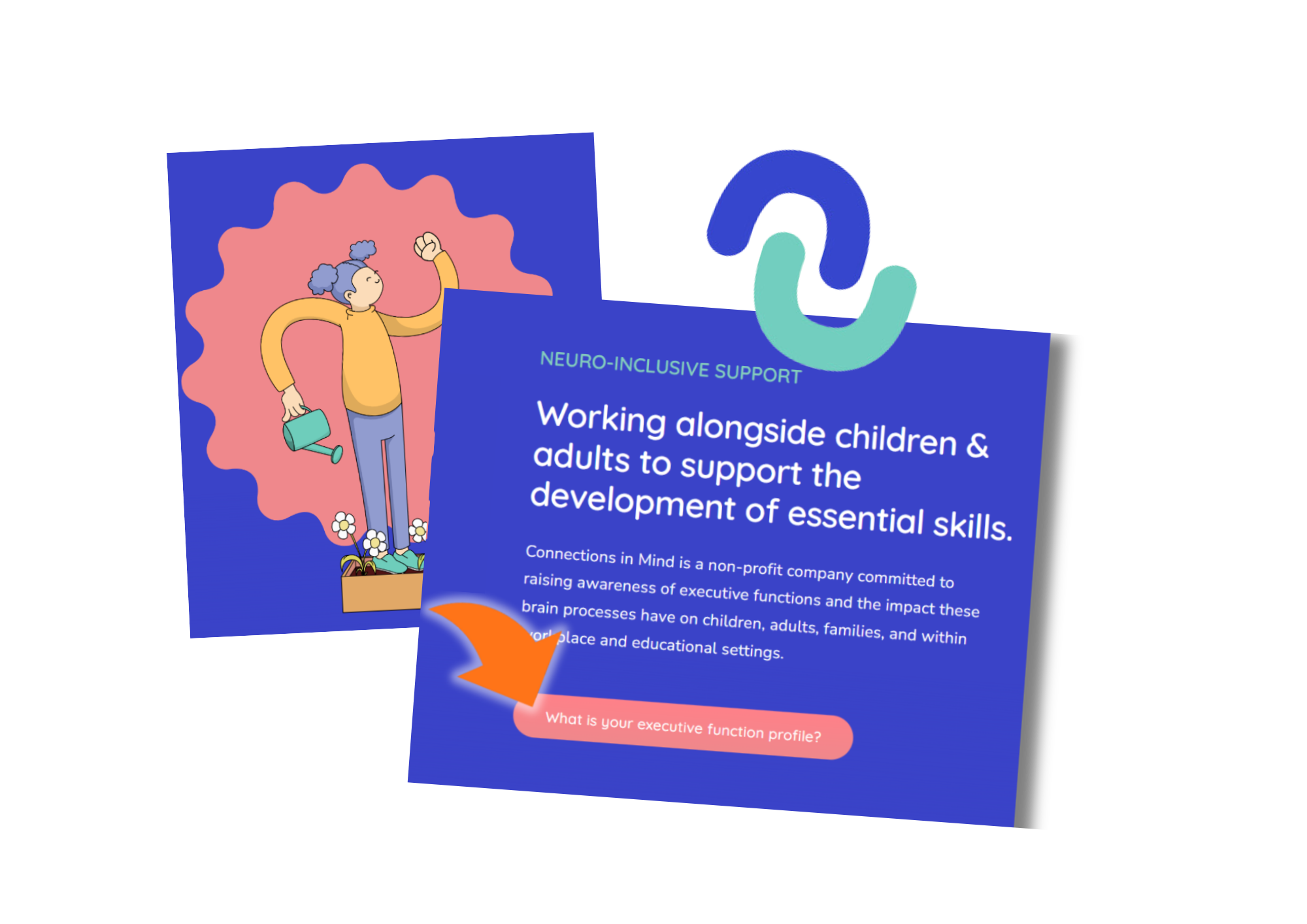Evaluation form template
Boost response rates on your evaluation form by incentivizing respondents with auto-personalized feedback.
With a well-thought evaluation form, you gather the information and input you need to make progress, whatever the stakes.
Pointerpro is the 2-in-1 software that combines assessment building with personalized PDF report generation.

Key tips: How to create an interactive evaluation form (template)?
This is where one evaluation form will distinguish itself from another: Engaging respondents.
It is crucial for obtaining valuable feedback. Here are some key tips to consider when building your questionnaire, no matter what evaluation form template you’re starting from:
- Apply clear and concise design: Keep the design clean and simple. Use clear and concise language for questions and instructions. Group related questions together for better flow.
- Create visual appeal: Use a visually appealing and consistent color scheme and fonts to make the form attractive. Add relevant images or icons to enhance the visual experience. If you have your own branding, definitely brand your evaluation form to make things look professional.
- Use progress indicators: Show users their progress within the form, indicating how many questions they've completed and how many are remaining. Progress bars or step indicators can make the process feel more manageable.
- Interactive question types: Use interactive elements such as sliders, rating scales, and checkboxes to make the form visually engaging. Consider using dynamic elements like pop-ups or tooltips for additional information.
- Work with conditional logic: Implement conditional logic to show or hide questions based on previous answers. This keeps the form dynamic and tailors the experience to individual responses.
- Give feedback during the questionnaire: Every once in a while, provide feedback between questions, if possible. For example, if the respondent just answered a group of related questions, it may be nice to summarize to keep the respondent engaged for the next group of questions.
- Give feedback after the questionnaire: Promise and provide respondents with more elaborate feedback after the questionnaire. Personalize the feedback based on the respondents’ answers.
- Create a form that has mobile responsiveness: Ensure your form is mobile-friendly. Many users access forms on their smartphones, so a responsive design is crucial for a positive user experience.
Creating a successful evaluation form is all about flow. In the video below, Pointerpro’s Stacy Demes explains the perks of what is often referred to as “a survey logic engine”: a crucial feature of Pointerpro to get respondents into that flow.
3 reasons to use Pointerpro as an evaluation form tool
3 reasons to use Pointerpro as an evaluation form tool
Interactive user experience
With the Questionnaire Builder, you get to create an engaging feedback form. How? With numerous design and layout options, useful widgets, and countless question types.
Refined, score-based analysis
Our custom scoring engine helps you quantify and categorize diverse answers. The result? An objective and nuanced assessment of your respondents’ evaluation.
Automated feedback in PDF
Thanks to your setup in the Report Builder, respondents instantly get a detailed PDF report: with personalized responses, useful information, and your brand design.
1.500+ businesses worldwide build assessments with Pointerpro









Start by writing an evaluation sheet. This is how you do it:
An evaluation sheet template is a document, generally in spreadsheet format. HR professionals, managers, and consultants use it to assess the performance, quality, or effectiveness of people they evaluate.
The evaluation sheet typically includes a set of questions that are used to centralize information and opinions for the purpose of analysis and improvement. In order to make evaluations measurable and consistent, consultants should turn it into a quantitative maturity model. This quantitative model forms the basis for building a score-based digital evaluation form.
Pointerpro’s Product Director Bruno shortly explains the principle of scoring in the video below.
40 evaluation form example questions
Here are 40 evaluation form example questions divided into 4 categories:
- 10 trainer evaluation form example questions
- 10 church employee evaluation example questions
- 10 pastor evaluation form example questions
- 10 candidate evaluation form example questions
10 trainer evaluation form example questions
- How well did the trainer communicate the course objectives?
- Were the training materials clear and effectively presented?
- Did the trainer encourage participant engagement and interaction?
- To what extent did the trainer demonstrate expertise in the subject matter?
- How well did the trainer manage time during the sessions?
- Did the trainer provide relevant examples to enhance understanding?
- Were the training activities and exercises beneficial for learning?
- How responsive was the trainer to participant questions and concerns?
- Did the trainer create a positive and inclusive learning environment?
- How likely are you to recommend this trainer for future sessions?
Trainer evaluation forms play a crucial role in improving the quality of training programs. The trainer evaluation form template questions in this list cover various aspects, such as communication, expertise, participant engagement, and responsiveness.
It’s important to have a balanced set of questions that not only highlight the strengths of the trainer but also identify areas for improvement. The answer options should provide a spectrum of responses, allowing participants to express nuanced opinions.
Collecting feedback on the trainer’s ability to create a positive learning environment and the relevance of activities ensures a holistic assessment. Also, the likelihood of recommending the trainer gauges overall satisfaction, reflecting the potential for future collaboration. Regularly using such evaluation forms facilitates continuous improvement in training delivery and enhances the overall learning experience.
10 church employee evaluation example questions
- How well does the employee embody the mission and values of the church?
- To what extent does the employee contribute to a positive and collaborative work environment?
- How effectively does the employee communicate with colleagues, leadership, and congregation members?
- In what ways does the employee demonstrate commitment and reliability in their role?
- How well does the employee handle challenges and conflicts within the church community?
- To what extent does the employee seek professional development and growth opportunities?
- How effectively does the employee engage with and support church members or attendees?
- In what ways does the employee contribute to the overall success of church events or programs?
- How well does the employee adapt to changes and new initiatives within the church?
- To what extent does the employee demonstrate alignment with the church's vision for outreach and community service?
Church employee evaluation forms are instrumental in assessing individuals’ contributions to the church community. These church evaluation form template questions cover various aspects, such as alignment with the church’s mission, interpersonal skills, adaptability, and commitment to professional growth.
The answer options should provide a spectrum of responses, allowing for nuanced feedback on each criterion. Assessing how well employees contribute to a positive work environment and engage with the congregation helps in maintaining a harmonious and supportive atmosphere within the church.
Evaluating the employees’ alignment with the church’s vision for outreach and community service ensures that their efforts are in line with the broader goals of the church. Regular use of these evaluation forms promotes continuous improvement and supports the development of a dedicated and effective church staff.
10 pastor evaluation form example questions
Within the same category, an evaluation form can be even more specific, of course. For instance, instead of evaluating the church in general, the evaluation form could focus on the pastor of the church in question. Here are some possible pastor evaluation form template questions:
- How effectively does the pastor communicate the teachings and values of the church?
- To what extent does the pastor provide pastoral care and support to congregation members?
- How well does the pastor engage with and connect to the diverse needs of the church community?
- In what ways does the pastor demonstrate effective leadership within the church?
- How well does the pastor collaborate with other church staff and leadership?
- To what extent does the pastor foster a sense of inclusivity and community within the congregation?
- How effectively does the pastor address and navigate challenging theological or ethical issues?
- In what ways does the pastor contribute to the spiritual growth and development of the congregation?
- How well does the pastor manage the administrative responsibilities of their role?
- To what extent does the pastor demonstrate a commitment to ongoing personal and professional growth?
Pastor evaluation forms are great tools for assessing the multifaceted responsibilities of a pastor within a church. The example questions provided cover areas such as communication, pastoral care, leadership, collaboration, and personal development. The answer should options offer a nuanced way to capture the diverse aspects of pastoral performance.
Assessing the pastor’s ability to navigate challenging issues and foster inclusivity reflects the need for well-rounded pastoral leadership. Additionally, evaluating administrative competence and commitment to ongoing growth ensures that the pastor is equipped to handle both the spiritual and organizational aspects of their role.
Consistent use of these evaluation forms helps facilitate open communication between the pastor and the congregation, promoting continuous improvement and a thriving church community.
10 job candidate evaluation form example questions
- How well does the candidate's experience align with the requirements of the position?
- To what extent does the candidate demonstrate strong communication skills, both written and verbal?
- How effectively does the candidate collaborate with team members and contribute to a positive work environment?
- In what ways does the candidate showcase problem-solving abilities and critical thinking skills?
- How well does the candidate adapt to new challenges and demonstrate a willingness to learn?
- To what extent does the candidate exhibit leadership qualities and the ability to take initiative?
- How effectively does the candidate handle stress and pressure in a professional setting
- In what ways does the candidate demonstrate attention to detail and accuracy in their work?
- How well does the candidate align with the company culture and values?
- To what extent does the candidate exhibit a strong work ethic and commitment to meeting deadlines?
These evaluation form template questions are designed to assess various aspects of a candidate’s suitability for a position, providing a comprehensive evaluation of their skills, behaviors, and compatibility with the company’s values and culture.
We advise you to adjust the answer options based on your specific evaluation criteria and rating scale.
What Pointerpro clients are saying




How to automate evaluation form delivery in your Evaluation Entry System (EES)
Like many Pointerpro clients you might be planning on distributing your evaluation forms on a large or even exponential scale. Maybe one thing is holding you back: The broader your distribution network, the trickier it gets to follow up, manage, and collect all the response data.
Well, it doesn’t have to be. With Pointerpro’s Distribution Portal, you delegate the distribution and follow-up of your forms to co-workers or customers. That way, they administer the forms to their own network.
All of the response data and insights are centralized for you in your admin zone on the Pointerpro platform. Do you have an external Evaluation Entry System in place already? Then you can integrate your EES with integration tools like Zapier. They streamline the process of collecting and managing response data.
Zapier acts as a bridge between the questionnaire software and the EES, automating the transfer of information seamlessly. Once a participant completes a questionnaire, Zapier triggers an action, such as sending an email or updating a database, and transfers the collected response data to the designated fields within the EES.
This automation eliminates the need for manual data entry, reducing the risk of errors and ensuring a swift and efficient flow of information. By leveraging integration tools like Zapier, organizations can effortlessly centralize and organize feedback data, enhancing the overall efficiency of their Evaluation Entry System and allowing for timely analysis and decision-making based on the received responses. Last but not least there’s always the Pointerpro API option to work with.
Here’s a short video that explains APIs in general terms:
17 more common evaluation form templates
Once you have the digital tool that suits your needs, there’s truly a myriad ways to customize an evaluation form. The number of use cases is boundless. If you work for an organization or as a consultant, we urge you to consider objectively how much work you could automate for yourself by investing time in building a thoughtful, engaging, and interactive evaluation form.
Here’s a list to get inspired.
- Employee performance evaluation form template: Assesses an employee's performance, accomplishments, and areas for improvement.
- Event evaluation form template: Collects feedback from participants regarding an event's organization, content, and overall experience.
- Customer evaluation form template: Measures satisfaction levels among customers regarding products, services, or overall experience.
- Product evaluation form template: Evaluates the performance, features, and satisfaction associated with a specific product.
- Course evaluation form template: Gathers feedback on a course's content, instructor, and overall educational experience.
- Website usability test form template: Assesses the ease of use and user experience of a website or application.
- Vendor performance evaluation form template: Assesses the performance of vendors or suppliers in delivering products or services.
- Project evaluation form template: Evaluates the success and effectiveness of a project in meeting its objectives.
- Workshop evaluation form template: Gathers participant feedback on workshops, seminars, or training sessions.
- Conference evaluation form template: Collects feedback on conferences, including speakers, sessions, and overall organization.
- Program effectiveness evaluation form template: Assesses the overall effectiveness of a program in achieving its goals and objectives.
- Health and safety inspection form template: Evaluates compliance with health and safety regulations within a workplace.
- 360-degree evaluation form template: Collects feedback from multiple sources, including peers, subordinates, and supervisors, to provide a comprehensive performance review.
- Leadership evaluation form template: Assesses the leadership qualities and effectiveness of managers or leaders within an organization.
- Volunteer evaluation form template: Collects feedback from volunteers regarding their experience, satisfaction, and suggestions for improvement.
- Marketing campaign evaluation form template: Evaluates the success and effectiveness of marketing campaigns in reaching target audiences and achieving objectives.
- Employee benefits evaluation form template: Gathers feedback from employees regarding their satisfaction with the organization's benefits package.
Evaluation form templates and evaluation principles for and beyond training
One domain we already touched upon briefly, where evaluation forms come in all the time, is the domain of learning and employee performance. In a corporate setting, HR professionals and managers need to assess their employees continually. Evaluation forms come in very handy of course.
In this context, experts insist on the importance of upholding certain key principles of evaluation. If you ask us, any evaluation form template should incorporate these core principles too. Here’s a brief explanation of each principle
- Validity: Evaluation methods and criteria should validly measure the intended aspects of performance or outcomes. Validity ensures that the evaluation accurately reflects the goals and objectives of the process.
- Reliability: Reliable evaluations produce consistent results when administered under similar conditions, establishing confidence in the consistency of data and judgments.
- Fairness: Evaluations must be fair and unbiased, offering an equitable opportunity for all participants to showcase their achievements or contributions. Fairness in evaluation avoids discrimination and considers diverse perspectives.
- Authenticity: Authentic evaluation tasks mirror real-world scenarios and contexts, ensuring that the performance or outcomes assessed are relevant and applicable in practical settings.
- Transparency: Transparency in evaluation processes and criteria is essential for clarity and understanding among both evaluators and participants. Transparent evaluations promote trust and accountability within the process.
- Flexibility: Evaluations should be flexible enough to accommodate diverse perspectives and contributions, allowing individuals to showcase their achievements in ways that align with their strengths.
- Relatability: Evaluations should be relatable to the goals and objectives being assessed. This principle emphasizes the importance of aligning evaluation criteria with the overall context and purpose of the evaluation.
- Feasibility: Evaluations should be practical and feasible within the available resources, including time, personnel, and technology. Feasibility ensures that evaluations are realistic, sustainable, and effectively contribute to decision-making processes.
These principles guide the design, implementation, and evaluation of processes across various settings, ensuring that evaluations are meaningful, accurate, and supportive of informed decision-making.
Create your evaluation form today
You may also be interested in
Recommended reading

How Connections In Mind benefits the community interest through a digital mindset and a longitudinal assessment
The fact that communities benefit from diversity should not be news to anybody. One type of diversity you may not

Vlerick Business School digitalizes entrepreneurship development with Pointerpro [case study]
What do a top-tier international business school based in the capital of Europe and Pointerpro have in common? At the

Attain Global: How to do psychometric tests right and build a cutting-edge international business [case study]
In many countries worldwide, the pursuit of skillful and engaged employees is not so much a war on talent as


